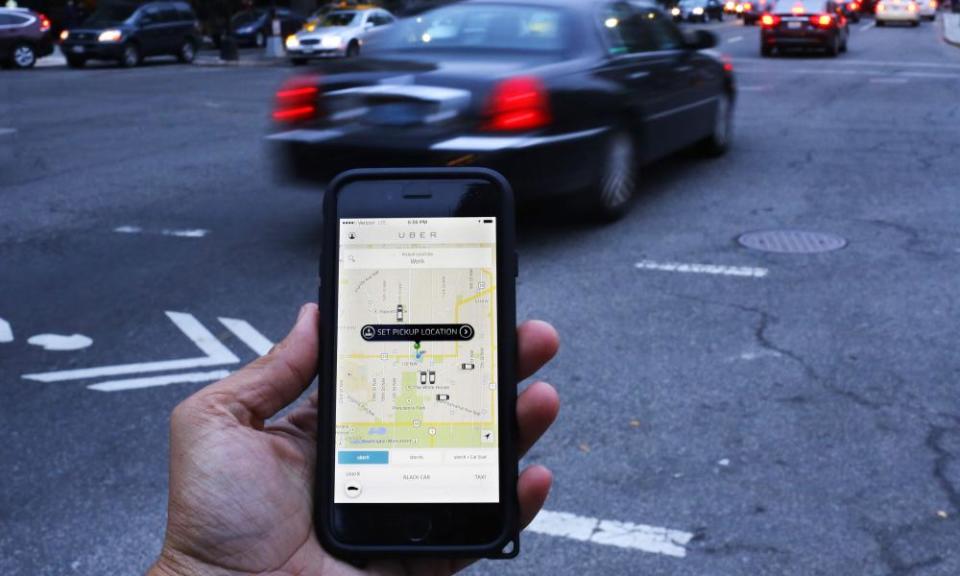Australian rideshare drivers found to be earning $12 an hour and at risk of harassment and assault

Uber and other rideshare drivers are earning an average of $12 an hour during the Covid-19 pandemic, and 17% have been sexually harassed or assaulted by passengers, according to a new survey of the gig economy.
A survey of 230 workers – 93% of whom work for Uber – has revealed a range of violent assaults, threats, racism and sexual harassment experienced by drivers.
More than half of the drivers said they struggled to pay the bills and buy groceries, and 85% said their wages had decreased while working in the gig economy.
The survey, conducted by the Transport Workers Union and the Rideshare Driver Network, also found 36% had been involved in a car accident while working.
Individual responses revealed specific violent assaults and sexual assaults that drivers experienced.
One driver told the survey: “I had my breast grabbed by a passenger”. Another said a man “whipped his dick out” during the trip.
One female driver told the survey: “I picked up a man who thought he had a right to touch me and to tell me out loud what he would like to do with me rather than go home to his wife.”
Another driver said a drunk man was put into her Uber by a friend as he was “too intoxicated” to go home himself.
“The drunk man came to halfway through the trip and confused me as a woman he was taking home rather than a rideshare driver,” she said. “Once we arrived at his home he refused to get out of my car and insisted I was his date. I was physically assaulted and sexually attacked.”
One male driver said he was sexually harassed by two women who “asked me for my background” and then groped him.
Related: Melbourne Uber drivers fear for their health as they transport passengers to Covid-19 tests
“I politely refused, saying I was a married man,” he said. “They forcefully touched me in my genitals.”
Another driver said a “passenger threatened to shoot me”, while another experienced “Multiple threats with a knife, multiple grabbing & punching”.
One driver said a group of four passengers once told him they would “do panel work on my car with my head”.
“[Four] young people [were] at pub wanting to get in car booked for 3 only,” he said. “[I] told they couldn’t and started saying they were about to do panel work on my car with my head. If I hadn’t pointed out the security cameras they would have gone through with it.”
Forty-one percent of those surveyed also said they experienced racism.
“People say me all the time ‘migrants, cunts go back to your country’,” one driver said.
Another said: “[I’ve] been called a black cunt by passengers while working in Queensland even though I told them that I was from Sydney and Australian and the rest shouldn’t matter.”
Eighty-five percent of those surveyed said that their wage had dropped over the time they had been driving.
The TWU calculated that the average hourly rate among the 230 drivers was $12.35 after expenses such as fuel. Sixty-seven per cent said they were not provided any additional safety training during Covid-19.
Many of the drivers worked for multiple apps but 93% of those surveyed did some work for Uber. Sixty-two per cent did some work for DiDi and 52% worked for Ola.
The national secretary of the TWU, Michael Kaine, said that the survey results showed that the gig economy needed to be regulated.
“We do not believe the Australian public agrees with this treatment of workers in Australia,” he said. “This is impacting our economy, as this low-paid, insecure work grows. Workers want jobs not ‘gigs.’”
Uber disputed the $12 an hour figure in the TWU survey and cited a report by Australian economic advisory firm Alphabeta that found in Sydney the average earnings per hour for drivers, net of costs, was estimated to be $21 per hour.
A spokeswoman for Uber said the company had a zero-tolerance policy towards any type of harassment or discriminatory behaviour and “continues to build cutting-edge technology and features to help improve safety for both driver-partners and riders”.
“Violence, sexual misconduct and discriminatory behaviour is not tolerated and is in clear violation of our community guidelines,” she said. “Riders can and do lose access to the Uber app for reports from drivers relating to inappropriate, discriminatory, racist or violent behaviour.
“Driver-partners have access to many of the same safety, transparency and accountability features that riders do, such as providing feedback and ratings for every trip, GPS records of each trip, the Safety Toolkit which includes an emergency assistance button to help connect people to 000 services if something goes wrong, and the ability to share trip details in real time with family or friends.
“Driver-partners in Australia are insured by Chubb for on-trip accidents, providing different types of payments if they are injured and unable to work.”

 Yahoo Finance
Yahoo Finance 